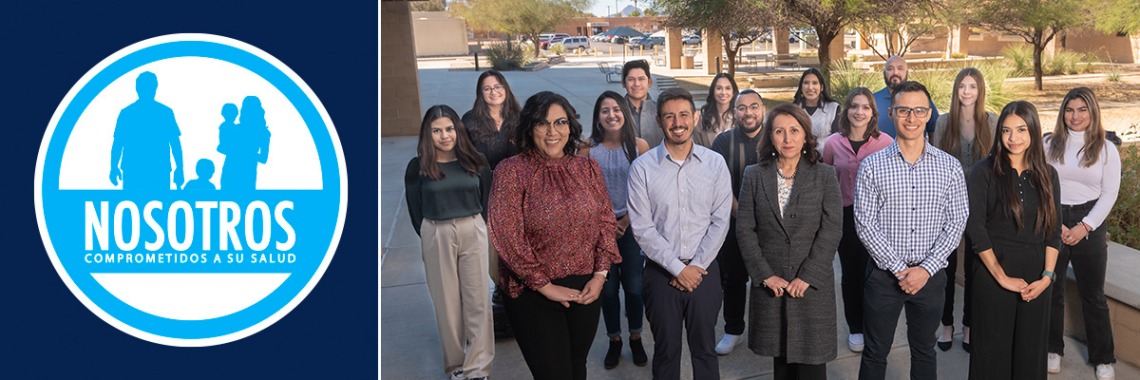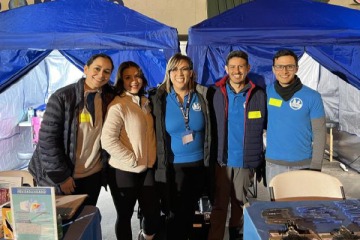Nosotros Comprometidos a Su Salud

About Us
The Nosotros Comprometidos a Su Salud public health program (in English: Committed to Your Health), fosters community-engaged research collaborations, service, and education to advance health equity in Southern Arizona. Based at the Zuckerman College of Public Health, University of Arizona Health Sciences, the Nosotros program works closely with under resourced and underserved Mexican-origin and other Hispanic communities who experience health inequities. Our goal is to improve health outcomes and wellness for people of all ages.

Community Building
Our dedication to community building in Pima County and Southern Arizona has shown demonstrably positive results. Our programs have led to weight-loss in partner communities, increased physical activity and healthy eating habits and increased awareness of substance abuse, smoking cessation, and the importance of early medical screening. We are passionate about delivering top quality services to our communities, and we believe in the value of bilingual health communications and resources for Hispanic and Latino families to build trust and partnership with the healthcare community.

Mission Statement
Our mission is to reduce health disparities faced by Mexican-origin communities and other Hispanic communities in Southern Arizona.

Why should I undergo a FibroScan®?
¿Por qué deberia de realizarme un FibroScan®?
Meet the Team

2022 Annual Report
Check out our Community Outreach and Engagement for Liver Disease Prevention and Treatment in Southern Arizona annual report.
Current Research Studies
Community Outreach and Engagement for Liver Disease Prevention and Treatment in Southern Arizona
Non-alcoholic fatty liver disease (NAFLD) is the most common cause of chronic liver disease in the U.S. and one of the greatest risk factors for liver cirrhosis, liver failure, and hepatocellular carcinoma. Relevant to Southern Arizona, rates of NAFLD are highest among individuals of Mexican-origin descent. Unfortunately, symptoms of NAFLD generally do not occur until the progression of disease becomes irreversible. Our early efforts to improve early detection and screening for NAFLD have focused on using a Fibroscan® in community-based settings. The Fibroscan® is a non-invasive device used to determine the amount of steatosis (fat) and fibrosis (scarring) levels in the liver. Working with promotoras, community partners, and the community itself, the proposed project will expand on previous efforts and provide individuals with the knowledge to spread awareness of NAFLD. It will also provide more educational support to individuals getting a Fibroscan® to ultimately reduce their risk and potentially reverse this condition through lifestyle changes, particularly with improving diet behaviors.
For more information or to schedule your free scan, please contact us:
Rosi Vogel: 526-7279 - office
Ana Gonzalez: 520-282-2785 call/ text / WhatsApp
A Gender and Culturally Specific Approach to Reduce NAFLD in Mexican-American Men
The Mexican-American population accounts for 64.3% of the U.S. Hispanic population and is the fastest growing Hispanic subgroup. Non-alcoholic fatty liver disease (NAFLD) is a chronic disease associated with obesity, and the highest rates of NAFLD among populations in the United States occur among Mexican-American men. NAFLD includes a spectrum of conditions, ranging from fatty liver to cirrhosis and liver cancer. Lack of physical activity and sugar-sweetened beverage consumption are major risk factors for NAFLD and are highly evident among Mexican-American males. Additionally, Mexican-American men are at increased risk of NAFLD and liver cancer if they carry of a specific version of a gene that has been shown to increase risk and severity of NAFLD.
In the absence of prescription medications, weight loss due to changes in diet and physical activity is highly recommended for the prevention and treatment of NAFLD. Changes in lifestyle that result in >5% body weight loss have been shown to reduce levels of liver fat and even reverse the condition. Despite the clear need to develop effective intervention strategies for Mexican-American men, at this time no studies have explored the use of health risk assessment strategies, including genetic risk, to motivate behavior changes that would reduce the risk of NAFLD in Mexican-American men. Consequently, this research will be the first to evaluate the knowledge, attitudes, and beliefs around NAFLD risk, including genetic risk, for Mexican-American men. In addition, this project could be the first weight loss intervention for Mexican-American men to incorporate genetic predisposition and lifestyle risk factors associated with NAFLD (e.g., dietary sugar consumption), as a strategy to improve engagement in weight loss and weight maintenance behaviors.
Cosechando la Salud: Understanding the Root Causes of Non-Alcoholic Fatty Liver Disease in Migrant/Seasonal Farmworkers
PI: Dr. Adriana Maldonado
Research Team: Dr. Julio Loya and Dr. David O. Garcia
Funding Agency: Community Foundation for Southern Arizona
Non-alcoholic fatty liver disease (NAFLD) affects approximately 43% of Mexican-origin adults in the U.S. Despite the disproportionate burden of NAFLD experienced by Mexican-origin adults, studies exploring NAFLD risk among migrant/seasonal farmworkers do not exist. This is surprising given migrant/seasonal farmworkers experience higher rates of hypertension, type 2 diabetes (T2D), hypercholesterolemia, and obesity, all of which are risk factors for NAFLD. Further, despite compelling evidence that the social and built environment affect health outcomes as much as individual-level characteristics, a neighborhood’s social and built environment factors have rarely been considered in cancer-related research. A neighborhood’s social and built environment can impact an individual’s health through allostatic load (AL), which is the wear and tear on the body due to stress. Thus, in partnership with Campesinos sin Fronteras, a non-profit organization dedicated to educating Yuma County residents to prevent chronic disease, injury, and illness associated with farmwork, Cosechando la Salud aims to (1) Examine associations between neighborhood context, allostatic load, and NAFLD in a cross-sectional sample of Mexican-origin migrant and seasonal farmworkers and (2) Conduct a participatory research process with Mexican-origin migrant and seasonal farmworkers using photovoice to identify neighborhood characteristics that influence allostatic load and NAFLD risk. Cosechando la Salud will have an important positive impact as the reduction of allostatic load and NAFLD risk can significantly decrease liver cancer risk for migrant/seasonal farmworkers.
Advancing Liver Cancer Prevention for Arizona American Indian Communities
PIs: Dr. David O. Garcia and Dr. Priscilla R. Sanderson
Funding: National Institutes of Health/National Cancer Institute
Research team: Drs. Timian M. Godfrey, Kimberly Shea, Sun Xiaoxiao, and Morgan Vigil-Hayes
American Indian (AI) communities experience higher rates of liver cancer incidence and mortality than the general United States population, particularly in the Southwest Region. Common risk factors for liver cancer include having hepatitis B or hepatitis C, cirrhosis, excessive alcohol consumption, lack of physical activity, non-alcoholic fatty liver disease (NAFLD), and obesity. Notably, a disproportionate prevalence of obesity-related diseases is experienced by AI people in the U.S. when compared to all other racial/ethnic groups, making their health status a key public health issue. Despite the clear need to develop effective liver cancer prevention strategies, a gap remains among AI communities and the scientific literature. To address these significant gaps, the interdisciplinary team and community partners will explore strategies to improve liver cancer prevention and health equity for AI communities by applying integrated scientific approaches and community engaged research methods. This high impact effort will advance research for liver cancer prevention in a high-risk group that carries a disparate liver cancer burden. To address these issues, this research will be the first to explore knowledge, attitudes, and beliefs of NAFLD health risk including lifestyle behaviors, held by community members from Navajo and Tohono O’odham nations. Our study will also determine risk factors for liver cancer, including NAFLD status in adults from Navajo and Tohono O’odham. Lastly, we would also like to evaluate the feasibility of a culturally and clinically appropriate telehealth assessment for liver and other cancer related risk factors.
Equity in Liver Cancer Treatment in Hispanic Americans
PI: Dr. David Garcia
Research Team: Drs. Adriana Maldonado, Kristin Morrill, Patrick Wightman, Paul Hsu, Celina Valencia, Geoffrey Block, Diego Leal, Melissa Flores, and Julio Loya
Funding Agency: American Cancer Society
Mexican-origin communities are disproportionately impacted by liver cancer. Compared to the U.S. population, the rates of liver cancer incidence and mortality are higher in Mexican-origin communities, particularly in the Southwest Region. Common risk factors for liver cancer include having hepatitis B or hepatitis C, non-alcoholic fatty liver disease (NAFLD), cirrhosis, excessive alcohol consumption, lack of physical activity, and obesity. Notably, Mexican-origin adults in the U.S. experienced a high prevalence of obesity-related diseases, making their health status a key public health issue. Despite the excessive burden of liver cancer experienced by Mexican-origin adults, to date, the influence of socio-environmental factors influencing liver cancer treatment disparities and advanced liver disease treatment for Mexican-origin adults remains to be determined. Using a health equity lens, a multidisciplinary team of investigators and community partners will explore strategies to improve liver cancer prevention for Mexican-origin communities with the goal of advancing research for liver cancer prevention in a high-risk group that carries a disparate liver cancer burden. The Specific Aims are to: (1) Assess whether neighborhood social deprivation predicts liver cancer treatment disparities between Hispanics and NHWs; (2) Identify social network characteristics of Mexican-origin adults that influence liver disease care; and (3) Inform the development of an integrated collaborative care model to improve health care access for Mexican-origin adults identified with liver disease. Our efforts are centered in developing a sustainable research agenda for Mexican-origin communities that fosters interdisciplinary, collaborative research, education, and outreach.
Research Projects
David O. Garcia, Cynthia Thomson, Jennifer Hatcher, David Marrero, Melanie Bell, Lindsay Kohler
Disease Management, Health Disparities, Health Promotion, Hispanic Health
2018 - 2023
Student Transformative Experiences to Progress Under-Represented Professionals (STEP-UP)
Cynthia Thomson, David O. Garcia, Robin Harris
Cancer, Health Disparities, Planning and Evaluation
2017 – 2022
David O. Garcia
Disease Management, Health Disparities, Hispanic Health
2020 - 2022
Study of Biomarkers in Ovarian Cancer: Modulation By Activity and Diet Intervention
Cynthia Thomson, Denise Roe, David O. Garcia
Cancer, Health Disparities, Health of Women, Children and Families, Nutrition & Diet
2015 - 2020
David O. Garcia, Yann Klimentidis
Cancer, Disease Management, Genetics, Hispanic Health
2018 - 2019
Creating a Tailored Lifestyle Intervention for Midlife Mexican American Men
David O. Garcia
Behavioral Health, Disease Management, Health Disparities, Health Promotion, Hispanic Health
2017 – 2018
Feasibility and acceptability of a Beverage Intervention for Hispanic Adults
David O. Garcia, Cynthia Thomson
Hispanic Health, Nutrition & Diet
2016 - 2017
David O. Garcia
Health Promotion, Hispanic Health
2016 - 2018
Dr. Adriana Maldondo, Dr. David O. Garcia, Dr. Rebecca Crocker, and Dr. Daniel Martinez
Health Promotion, Hispanic Health
2022 - 2023
Latest News
Interested in joining the Nosotros team?
testimonials
"Thank you for all the support to our TUSD parent community and the Tucson community. Prevention is super important and above all, thank you for the learning opportunities about health for all."
Rosa Maria Escalante | School Community Liaison
Contact Us
For more information regarding the Nosotros organization, please call or email:
David O. Garcia, PhD, Program Director
davidogarcia@arizona.edu
Rosi Vogel, Program Coordinator
rosimvogel@arizona.edu
Office: 520-626-7279
Text / WhatsApp: 520-282-2785
Or scan here



